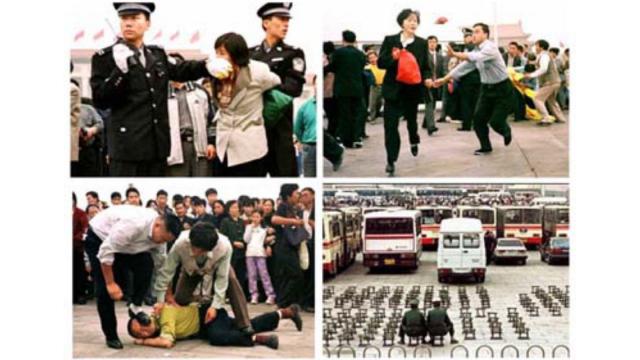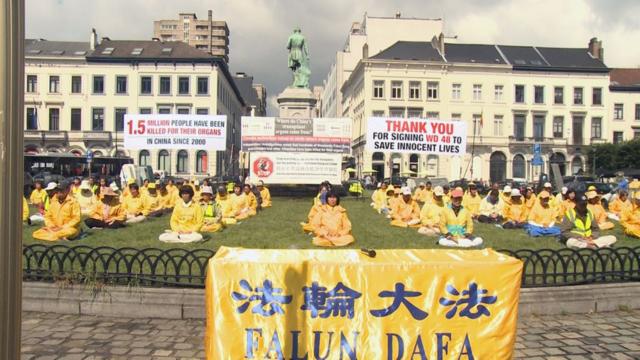They are involved in 15 filed cases of open persecution of Falun Gong practitioners. It would be cynical to foresee that no government will respond. But if at least some will, a new era begins.
by Marco Respinti
Part 2 of 4. Read article 1.


“July 20 will mark 24 years of the severe persecution of Falun Gong in China. We are submitting to you 19 Chinese Communist Party (CCP) officials responsible for gross human rights abuses during this persecution. We call on our government to sanction these individuals using any and all applicable laws.”
This is the beginning of the letter that Falun Gong practitioners living in 44 countries sent to the chiefs of the respective governments, urging them to hold accountable Chinese officers they aptly listed.
“Launched in July 1999,” the letter continues, “the CCP’s campaign to eliminate Falun Gong remains one of the largest human rights crises in China today. When this persecution first began, 70-100 million people from all walks of life practiced Falun Gong in China. Since then, millions of them have been detained or imprisoned. The documented death cases due to persecution have reached 4,921. An untold number of Falun Gong practitioners, likely hundreds of thousands, have been killed through forced organ harvesting, according to testimonies from the China Tribunal to the United Nations. The CCP has also used Falun Gong as a testing ground for repressive tactics, technology, and security agencies that have then been deployed against other persecuted groups in recent years.” Unfortunately, crimes run faster that e-mails and in the time elapsed since the letter was drafted, in early July, 2023, the documented number of deaths surpassed 5,000.
The Chinese regime’s persecution of Falun Gong has also extended, as the letter points out, “into other countries. Falun Gong practitioners have been a top target of the CCP’s massive campaign of transnational repression outside China. Beijing’s brazen operation was recently evident in a U.S. Department of Justice indictment of two CCP agents who attempted to bribe a purported tax official to strip the non-profit status from a Falun Gong organization. Another indictment earlier this year exposed CCP agents for their role in an overseas Chinese police station in New York City and the silencing of Falun Gong protests in Washington.”
Sanctions against the CCP officials “have been effective deterring the persecution in China,” the document says, indirectly pointing at the “Global Magnitsky Act,” i.e., formally, the “Global Magnitsky Human Rights Accountability Act, an extension of the Russia and Moldova Jackson-Vanik Repeal and Sergei Magnitsky Rule of Law Accountability Act of 2012,” which allows the U.S. Government to sanction foreign government officials implicated in human rights abuses anywhere in the world. In practice, the letter urges the US to act on that basis and other countries to find ways to imitate them or pass similar legislations. “Bitter Winter,” courtesy of the Falun Dafa InfoCenter which prepared it for the US Department of State, saw a document entitled “The Impact Inside China from U.S. Sanctions and Other Targeted Measures” which supports the case. In fact, “[t]he feedback from China shows that in many cases, [after sanctions were imposed] Falun Gong practitioners have been released from custody and had their belongings returned, and Chinese security officials are distancing themselves from agencies or departments known to participate in persecuting Falun Gong.”


The list of the 44 countries to which the letter was sent is available on Minghui.org, the web site of a volunteer organization working as a central communication hub for the Falun Gong community in the world. Minghui published some of the most comprehensive and updated data on the persecution.
The 44 countries include all the “Five Eyes” alliance members (an international intelligence operation for security), many nations of Asia, America, and Europe, and all the 27 countries of the European Union. They are Australia, Canada, the United Kingdom, the United States, and New Zealand. Then Argentina, Chile, Colombia, Dominica, Indonesia, Israel, Liechtenstein, Mexico, Norway, Japan, South Korea, and Switzerland. And also Austria, Belgium, Bulgaria, Croatia, Cyprus, the Czech Republic, Denmark, Estonia, Finland, France, Germany, Greece, Hungary, Ireland, Italy, Latvia, Lithuania, Luxembourg, Malta, the Netherlands, Poland, Portugal, Romania, Slovakia, Spain, Sweden, and Slovenia.
19 indicted CCP officials are listed as well by Minghui.org. The letter sent by Falun Gong practitioners to the chiefs of the 44 governments of the countries they live in includes “15 case files” where those 19 officers were found “responsible for severe human rights violations, including torture and extrajudicial killing of individuals seeking to exercise and defend their freedom of religion, belief, expression, and thought.” Minghui.org underlines that “[o]fficials from the U.S. State Department informed several years ago that the materials provided by Falun Gong practitioners are authentic and credible, presented in a professional manner, and can be used as a model for other groups.”


The 19 persecutors targeted are:
• Fan Lubing: Director of the Prison Administration Bureau of the Ministry of Justice, former Secretary of the Party Committee of the Central Judicial Police Academy (National Lawyer Academy), former director of the Research Office of the Ministry of Justice (director of the Judicial Research Institute) and editor of the “China Judicial” magazine.
• Li Rulin: President of China Institute of Integrity and Legal System, former Deputy Chief Procurator of the Supreme Procuratorate, former member of the Party Leadership Group and Director of the Political Department of the Supreme Procuratorate, former Director of the Labor Re-education Administration of the Ministry of Justice.
• Liu Jiayi: Member of the Standing Committee of the 14th National Committee of the Chinese People’s Political Consultative Conference, Director of the Proposal Committee, former Secretary of the Shandong Provincial Party Committee.
• Ye Hanbing: Vice Governor of Sichuan Province, Director and Party Secretary of the Provincial Public Security Department, Deputy Secretary of the Political and Legal Committee of the Provincial Party Committee, former Deputy Director of the Zhejiang Provincial Public Security Department, former Deputy Secretary of the Hangzhou Municipal Legal Committee, Party Secretary and Director of the Hangzhou Public Security Bureau and Inspector General.
• Li Chenglin: Deputy Governor of Shanxi Province, Deputy Secretary of the Political and Legal Committee of the Provincial Party Committee, Secretary of the Party Committee and Director of the Provincial Public Security Department, Former Secretary of the Party Leadership Group, Chief Prosecutor of the Liaoning Provincial Procuratorate, Member of the Political and Legal Committee of the Provincial Party Committee, Former Deputy Secretary of the Party Leadership Group of the Higher Court of Jilin Province.
• You Quanrong: Secretary of the Party Leadership Group, Vice President, Acting President, and President of the High Court of Hubei Province.
• Zhang Yi: Secretary of the Party Leadership Group and Chief Prosecutor of the Hainan Provincial Procuratorate, Deputy Secretary of the Political and Legal Committee of the Provincial Party Committee, Former Party Secretary and Director of the Jilin Provincial Judicial Department, Former First Political Commissar of the Jilin Provincial Prison Administration Bureau, Former Executive Deputy Secretary of the Party Committee of the Ministry of Justice. He is also Secretary of the Commission for Discipline Inspection and former Deputy Director of the Legal Affairs Department of the Ministry of Justice.
• Tan Zunhua: First-level inspector of Heilongjiang Prison Administration Bureau, former member of the Party Committee of the Heilongjiang Provincial Department of Justice, Deputy Secretary of the Party Committee and Director of the Provincial Prison Administration Bureau.
• Yi Jianmin: Member of the Party Committee of the Department of Justice of Heilongjiang Province, Secretary of the Party Committee and Director of the Provincial Prison Administration Bureau.
• Li Yilong: Deputy Secretary of the Wuhan Municipal Party Committee, Secretary of the Political and Legal Committee, former member of the Standing Committee of the Wuhan Municipal Party Committee, Deputy Secretary of the Political and Legal Committee of the Municipal Party Committee, Secretary of the Party Committee and Director of the Municipal Public Security Bureau, former Deputy Director of the Public Security Department of Hubei Province, director of the Political Department, former member of the Standing Committee of the Ezhou Municipal Committee of Hubei Province, Secretary of the Political and Legal Committee of the Municipal Party Committee, and Director of the Municipal Public Security Bureau.
• Xue Changyi: Member of the Party Leadership Group, Deputy Chief Prosecutor, Member of the Procuratorial Committee, Senior Prosecutor of the Henan Provincial Procuratorate, Former Chief Procurator of the Nanyang City, Procuratorate of Henan Province.
• Li Qiang: Deputy Governor of Ganzi Prefecture, Sichuan Province, Secretary of the Party Committee and Chief Inspector of the State Public Security Bureau, Deputy Secretary of the Political and Legal Committee of the State Party Committee, and former Chief of the National Security Corps of the Sichuan Provincial Public Security Bureau.
• Dong Kaide: Executive Deputy Secretary of Shenyang Municipal Legal Committee, former Director of Shenyang Municipal Bureau of Justice and Director of Prison Administration.
• Tian Zhi: Director of Shenyang Dongling Prison, former director of Shenyang Zhangshi Drug Rehabilitation Center.
• Qin Keping: Warden and Political Commissar of Jiazhou Prison, Sichuan Province.
• Luo Jiangtao: Director of the Political Department of Jiazhou Prison, Sichuan Province, former Head of the Education and Reform Section of Jiazhou Prison.
• Shao Ling: Chief of the Education and Reform Section of Jiazhou Prison, Sichuan Province.
• Li Peng: Deputy Governor of Aba Tibetan and Qiang Autonomous Prefecture, Sichuan Province, Director of the Public Security Bureau, and the Deputy Secretary of the Political and Legal Committee.
• Tang Jinfeng: Deputy Chief Prosecutor and member of the Procuratorate Committee of Fengcheng Procuratorate, Liaoning Province.
If the governments called to action will respond, it will really be the dawn of a new era.









